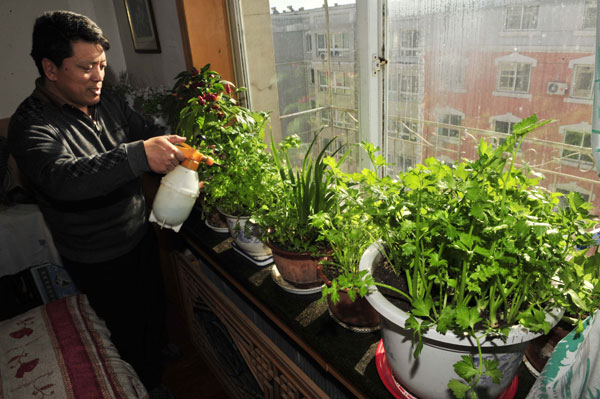Society
Home-made food from the pot
By Yang Yijun (China Daily)
Updated: 2010-12-06 07:54
 |
Large Medium Small |
|
 A resident, surnamed Jia, in Shenyang of Northeast China's Liaoning province, waters his vegetables at his home on Nov 23. [Provided to China Daily] |
SHANGHAI - More Chinese consumers say they are growing vegetables at home in response to rising prices and food safety issues. Prices of major types of vegetables grew 10.1 percent in October from those in September alone, figures from the National Development and Reform Commission showed.
| ||||
Qiu, who lives on the ground floor of an apartment block and has a garden, started to grow chili, towel gourd, cucumber and spring onion this summer.
"It really saves money, though I haven't calculated the exact amount," Qiu says.
"It doesn't take much time. I only need to water them occasionally."
In Fuzhou of Fujian province, a number of migrant workers living in the suburbs of the city are using waste compactors to grow vegetables as they do not have land to do so, the China News Service reported.
The migrants grow eggplant, sweet potato and cabbage in more than 10 such containers outside their rented homes.
The homegrown vegetables help the workers cope with mounting food prices, one of them told the press.
The trend has also caused a boom in online sales of vegetable seed in China.
Many vendors at China's largest online marketplace, Taobao.com, have reported booming sales for vegetable seed in recent months, with some of them selling several hundred packages of a single kind of seed in one month, Chinese media reported.
Those concerned with rising food safety issues in China are also turning to homegrown vegetables to ensure a healthy diet.
Zhang Lin, a 29-year-old housewife in Shanghai, grows more than 60 kinds of vegetables in an area of more than 10 square meters in her balcony and kitchen.
"I dare not eat the vegetables bought from the markets here, because even the organic vegetables in the supermarkets may have pesticides. But I can guarantee that no pesticide is used in the vegetables I plant," said Zhang, who studied in the United Kingdom for several years and enjoys cooking Western food at home.
In addition to common fare, she plants other produce that is rare in China, such as Swiss beet and Japanese mini-carrot that are commonly used in Western food.
"In the imported food market, I can only find one kind of basil. But it cannot be used for some dishes," she said.
"But I found out that there are more than 30 kinds of basil seeds from the US and Germany at Taobao.com, so I started to buy the seeds and plant them myself."
She sows the seeds twice a month and the harvest is enough to make salads for two people every day.
When she started to plant vegetables in June 2009, she spent more than 2,000 yuan ($300) for soil, pots and fertilizer.
"I chose imported brands to make sure the vegetables are of good quality," she said.
"So far, the average cost is more than 100 yuan each month. The cost will be much lower, about 50 yuan, if I use domestic brands, which is still lower than if I buy vegetables from the markets," she said.
Other people plant vegetables at home for fun.
Liang Jing, a retired doctor, has been growing vegetables on her balcony for more than a year.
"I think it's great fun to grow vegetables by myself," she said. "And it's not a difficult job."
"A friend of mine gave me my first seeds. After that I searched the Internet and learned how to grow vegetables at home."
She grows sword bean tomato, and orange regularly, which are usually enough for a meal for three.
"The seeds are either bought from online stores or sent by my friends, so the cost is rather low," she said.
"Similar to other plants, vegetables planted at home can help to purify air in the room. What's more, the nutrition can be the same as those grown by professional farmers as long as the soil is not polluted," said an agricultural researcher, surnamed Lin, at the Shanghai agricultural hotline.
China Daily



